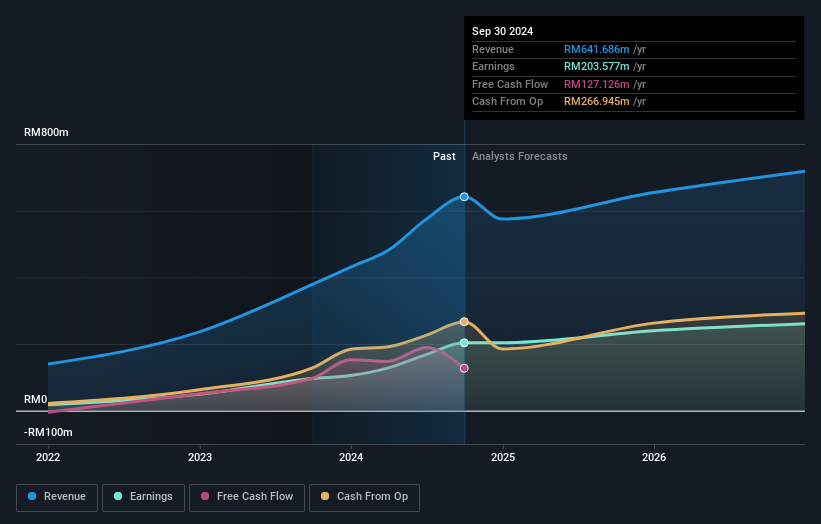- Malaysia
- /
- Energy Services
- /
- KLSE:KEYFIELD
Keyfield International Berhad's (KLSE:KEYFIELD) CEO Chit Huei Kee is the most upbeat insider, and their holdings increased by 12% last week

Key Insights
- Significant insider control over Keyfield International Berhad implies vested interests in company growth
- A total of 2 investors have a majority stake in the company with 54% ownership
- Past performance of a company along with ownership data serve to give a strong idea about prospects for a business
Every investor in Keyfield International Berhad (KLSE:KEYFIELD) should be aware of the most powerful shareholder groups. We can see that individual insiders own the lion's share in the company with 37% ownership. Put another way, the group faces the maximum upside potential (or downside risk).
Clearly, insiders benefitted the most after the company's market cap rose by RM217m last week.
Let's take a closer look to see what the different types of shareholders can tell us about Keyfield International Berhad.
Check out our latest analysis for Keyfield International Berhad

What Does The Institutional Ownership Tell Us About Keyfield International Berhad?
Institutions typically measure themselves against a benchmark when reporting to their own investors, so they often become more enthusiastic about a stock once it's included in a major index. We would expect most companies to have some institutions on the register, especially if they are growing.
As you can see, institutional investors have a fair amount of stake in Keyfield International Berhad. This can indicate that the company has a certain degree of credibility in the investment community. However, it is best to be wary of relying on the supposed validation that comes with institutional investors. They too, get it wrong sometimes. If multiple institutions change their view on a stock at the same time, you could see the share price drop fast. It's therefore worth looking at Keyfield International Berhad's earnings history below. Of course, the future is what really matters.

We note that hedge funds don't have a meaningful investment in Keyfield International Berhad. With a 27% stake, CEO Chit Huei Kee is the largest shareholder. In comparison, the second and third largest shareholders hold about 27% and 10% of the stock. Interestingly, the third-largest shareholder, Mohd Bin Ahmad is also a Member of the Board of Directors, again, indicating strong insider ownership amongst the company's top shareholders.
A more detailed study of the shareholder registry showed us that 2 of the top shareholders have a considerable amount of ownership in the company, via their 54% stake.
While it makes sense to study institutional ownership data for a company, it also makes sense to study analyst sentiments to know which way the wind is blowing. While there is some analyst coverage, the company is probably not widely covered. So it could gain more attention, down the track.
Insider Ownership Of Keyfield International Berhad
The definition of an insider can differ slightly between different countries, but members of the board of directors always count. The company management answer to the board and the latter should represent the interests of shareholders. Notably, sometimes top-level managers are on the board themselves.
Most consider insider ownership a positive because it can indicate the board is well aligned with other shareholders. However, on some occasions too much power is concentrated within this group.
It seems insiders own a significant proportion of Keyfield International Berhad. It has a market capitalization of just RM2.0b, and insiders have RM731m worth of shares in their own names. It is great to see insiders so invested in the business. It might be worth checking if those insiders have been buying recently.
General Public Ownership
With a 21% ownership, the general public, mostly comprising of individual investors, have some degree of sway over Keyfield International Berhad. This size of ownership, while considerable, may not be enough to change company policy if the decision is not in sync with other large shareholders.
Private Company Ownership
We can see that Private Companies own 36%, of the shares on issue. It might be worth looking deeper into this. If related parties, such as insiders, have an interest in one of these private companies, that should be disclosed in the annual report. Private companies may also have a strategic interest in the company.
Next Steps:
It's always worth thinking about the different groups who own shares in a company. But to understand Keyfield International Berhad better, we need to consider many other factors.
I always like to check for a history of revenue growth. You can too, by accessing this free chart of historic revenue and earnings in this detailed graph.
If you would prefer discover what analysts are predicting in terms of future growth, do not miss this free report on analyst forecasts.
NB: Figures in this article are calculated using data from the last twelve months, which refer to the 12-month period ending on the last date of the month the financial statement is dated. This may not be consistent with full year annual report figures.
Valuation is complex, but we're here to simplify it.
Discover if Keyfield International Berhad might be undervalued or overvalued with our detailed analysis, featuring fair value estimates, potential risks, dividends, insider trades, and its financial condition.
Access Free AnalysisHave feedback on this article? Concerned about the content? Get in touch with us directly. Alternatively, email editorial-team (at) simplywallst.com.
This article by Simply Wall St is general in nature. We provide commentary based on historical data and analyst forecasts only using an unbiased methodology and our articles are not intended to be financial advice. It does not constitute a recommendation to buy or sell any stock, and does not take account of your objectives, or your financial situation. We aim to bring you long-term focused analysis driven by fundamental data. Note that our analysis may not factor in the latest price-sensitive company announcements or qualitative material. Simply Wall St has no position in any stocks mentioned.
About KLSE:KEYFIELD
Keyfield International Berhad
Engages in the chartering of own and third-party vessels in Malaysia.
Outstanding track record with excellent balance sheet and pays a dividend.
Similar Companies
Market Insights
Community Narratives



